Report on Sustainable Tourism: Planning, Impacts, and Future Dev
VerifiedAdded on 2024/05/21
|28
|5321
|150
Report
AI Summary
This report provides a comprehensive analysis of sustainable tourism development, focusing on the benefits for stakeholders through effective planning, the advantages and disadvantages of public/private sector partnerships using Qatar as a case study, and the features of tourism development planning at different levels (regional, sub-regional, national, and international). It highlights the significance of interactive planning systems and processes, methods to measure tourist impact (Economic Impact Model, CEIM, STEAM), and introduces the concept of sustainability in tourism, including factors hindering its development and the stages involved in planning for sustainability. Furthermore, the report addresses methods for resolving conflicts of interest, balancing supply and demand, and evaluating the moral and ethical issues of enclave tourism. Finally, it examines current issues in tourism development in developing countries and emerging destinations, offering recommendations for future development, emphasizing the importance of understanding the rationale and techniques for tourism planning and development along with sustainable practices.
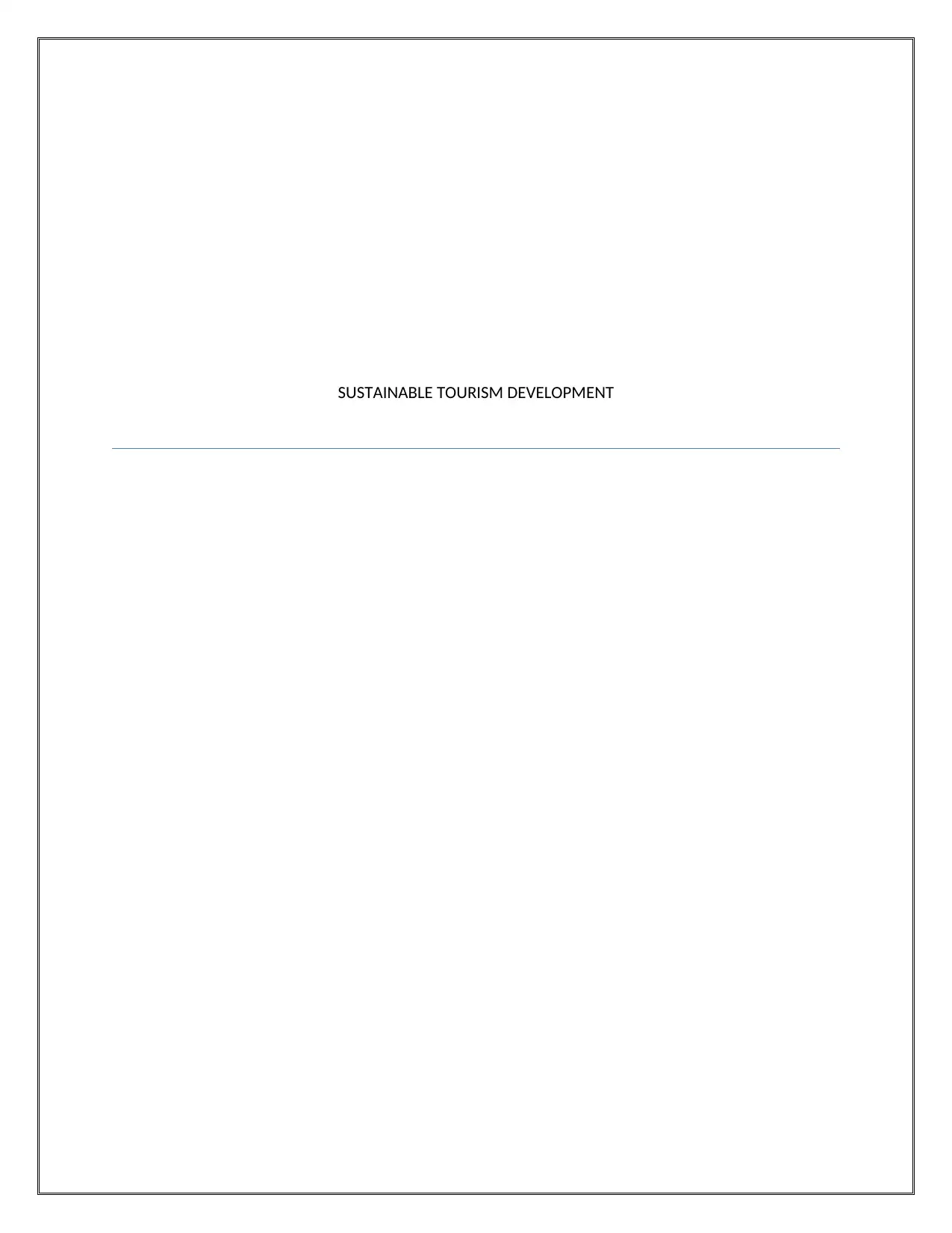
SUSTAINABLE TOURISM DEVELOPMENT
Paraphrase This Document
Need a fresh take? Get an instant paraphrase of this document with our AI Paraphraser
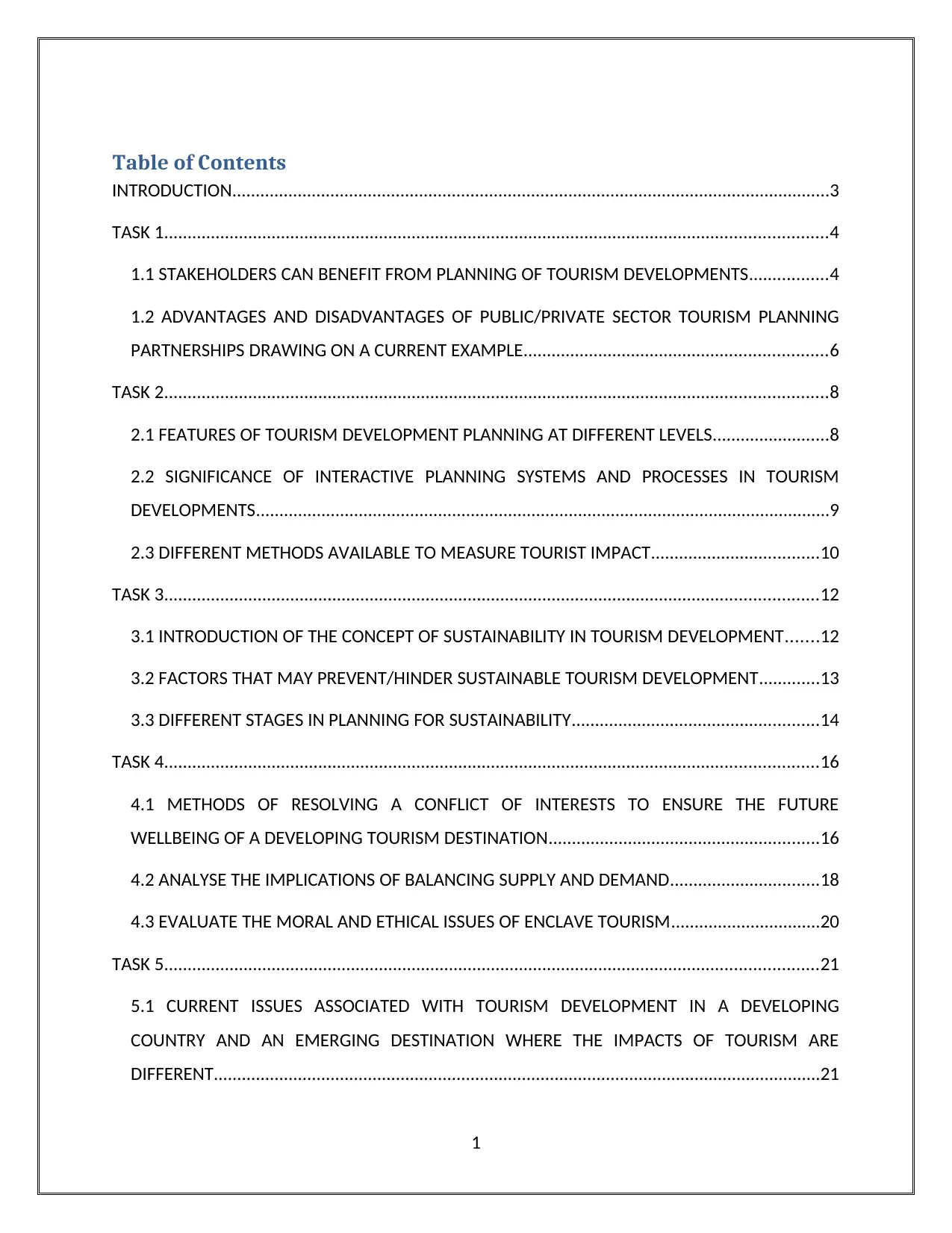
Table of Contents
INTRODUCTION................................................................................................................................3
TASK 1..............................................................................................................................................4
1.1 STAKEHOLDERS CAN BENEFIT FROM PLANNING OF TOURISM DEVELOPMENTS.................4
1.2 ADVANTAGES AND DISADVANTAGES OF PUBLIC/PRIVATE SECTOR TOURISM PLANNING
PARTNERSHIPS DRAWING ON A CURRENT EXAMPLE.................................................................6
TASK 2..............................................................................................................................................8
2.1 FEATURES OF TOURISM DEVELOPMENT PLANNING AT DIFFERENT LEVELS.........................8
2.2 SIGNIFICANCE OF INTERACTIVE PLANNING SYSTEMS AND PROCESSES IN TOURISM
DEVELOPMENTS...........................................................................................................................9
2.3 DIFFERENT METHODS AVAILABLE TO MEASURE TOURIST IMPACT....................................10
TASK 3............................................................................................................................................12
3.1 INTRODUCTION OF THE CONCEPT OF SUSTAINABILITY IN TOURISM DEVELOPMENT.......12
3.2 FACTORS THAT MAY PREVENT/HINDER SUSTAINABLE TOURISM DEVELOPMENT.............13
3.3 DIFFERENT STAGES IN PLANNING FOR SUSTAINABILITY.....................................................14
TASK 4............................................................................................................................................16
4.1 METHODS OF RESOLVING A CONFLICT OF INTERESTS TO ENSURE THE FUTURE
WELLBEING OF A DEVELOPING TOURISM DESTINATION..........................................................16
4.2 ANALYSE THE IMPLICATIONS OF BALANCING SUPPLY AND DEMAND................................18
4.3 EVALUATE THE MORAL AND ETHICAL ISSUES OF ENCLAVE TOURISM................................20
TASK 5............................................................................................................................................21
5.1 CURRENT ISSUES ASSOCIATED WITH TOURISM DEVELOPMENT IN A DEVELOPING
COUNTRY AND AN EMERGING DESTINATION WHERE THE IMPACTS OF TOURISM ARE
DIFFERENT..................................................................................................................................21
1
INTRODUCTION................................................................................................................................3
TASK 1..............................................................................................................................................4
1.1 STAKEHOLDERS CAN BENEFIT FROM PLANNING OF TOURISM DEVELOPMENTS.................4
1.2 ADVANTAGES AND DISADVANTAGES OF PUBLIC/PRIVATE SECTOR TOURISM PLANNING
PARTNERSHIPS DRAWING ON A CURRENT EXAMPLE.................................................................6
TASK 2..............................................................................................................................................8
2.1 FEATURES OF TOURISM DEVELOPMENT PLANNING AT DIFFERENT LEVELS.........................8
2.2 SIGNIFICANCE OF INTERACTIVE PLANNING SYSTEMS AND PROCESSES IN TOURISM
DEVELOPMENTS...........................................................................................................................9
2.3 DIFFERENT METHODS AVAILABLE TO MEASURE TOURIST IMPACT....................................10
TASK 3............................................................................................................................................12
3.1 INTRODUCTION OF THE CONCEPT OF SUSTAINABILITY IN TOURISM DEVELOPMENT.......12
3.2 FACTORS THAT MAY PREVENT/HINDER SUSTAINABLE TOURISM DEVELOPMENT.............13
3.3 DIFFERENT STAGES IN PLANNING FOR SUSTAINABILITY.....................................................14
TASK 4............................................................................................................................................16
4.1 METHODS OF RESOLVING A CONFLICT OF INTERESTS TO ENSURE THE FUTURE
WELLBEING OF A DEVELOPING TOURISM DESTINATION..........................................................16
4.2 ANALYSE THE IMPLICATIONS OF BALANCING SUPPLY AND DEMAND................................18
4.3 EVALUATE THE MORAL AND ETHICAL ISSUES OF ENCLAVE TOURISM................................20
TASK 5............................................................................................................................................21
5.1 CURRENT ISSUES ASSOCIATED WITH TOURISM DEVELOPMENT IN A DEVELOPING
COUNTRY AND AN EMERGING DESTINATION WHERE THE IMPACTS OF TOURISM ARE
DIFFERENT..................................................................................................................................21
1
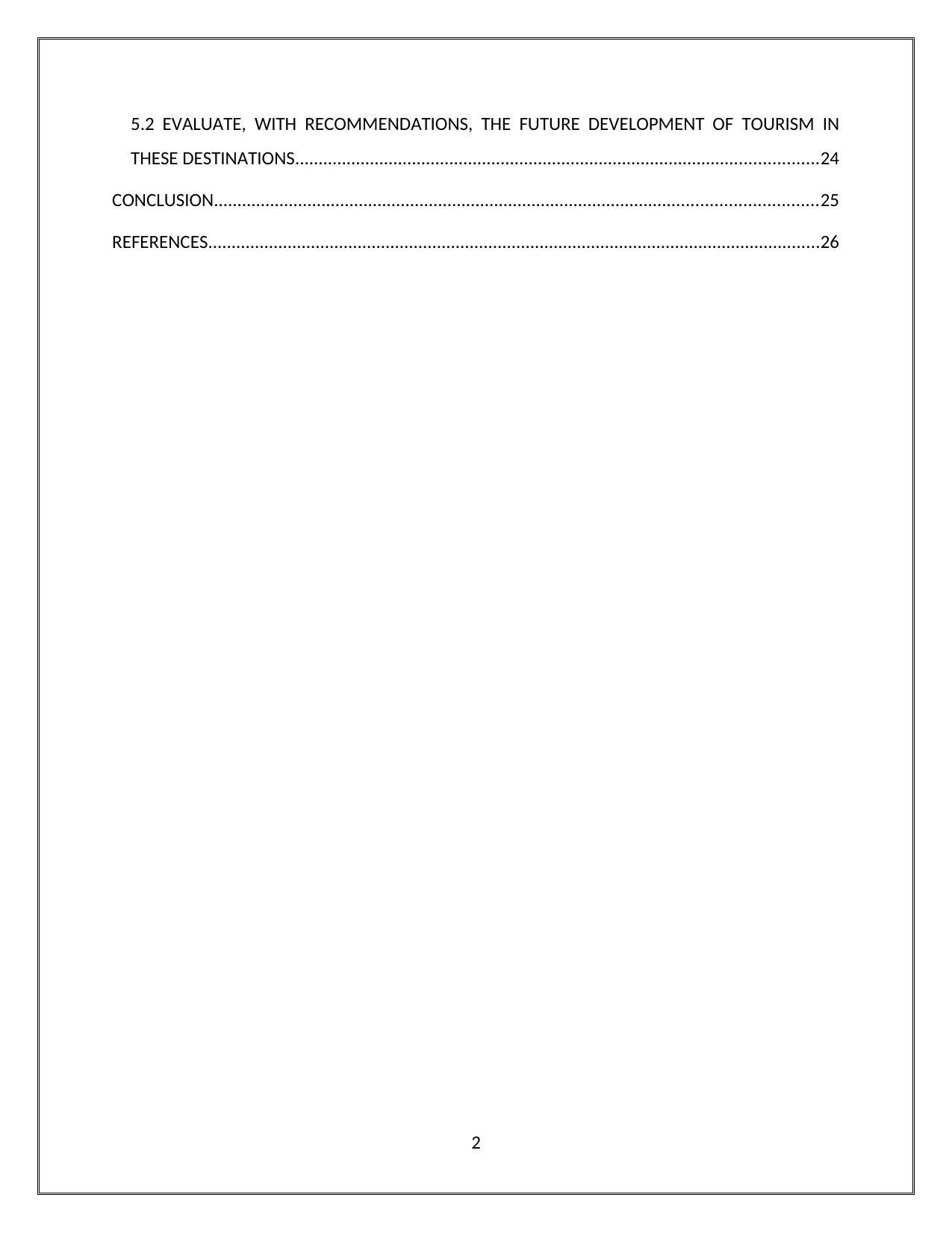
5.2 EVALUATE, WITH RECOMMENDATIONS, THE FUTURE DEVELOPMENT OF TOURISM IN
THESE DESTINATIONS................................................................................................................24
CONCLUSION.................................................................................................................................25
REFERENCES...................................................................................................................................26
2
THESE DESTINATIONS................................................................................................................24
CONCLUSION.................................................................................................................................25
REFERENCES...................................................................................................................................26
2
⊘ This is a preview!⊘
Do you want full access?
Subscribe today to unlock all pages.

Trusted by 1+ million students worldwide
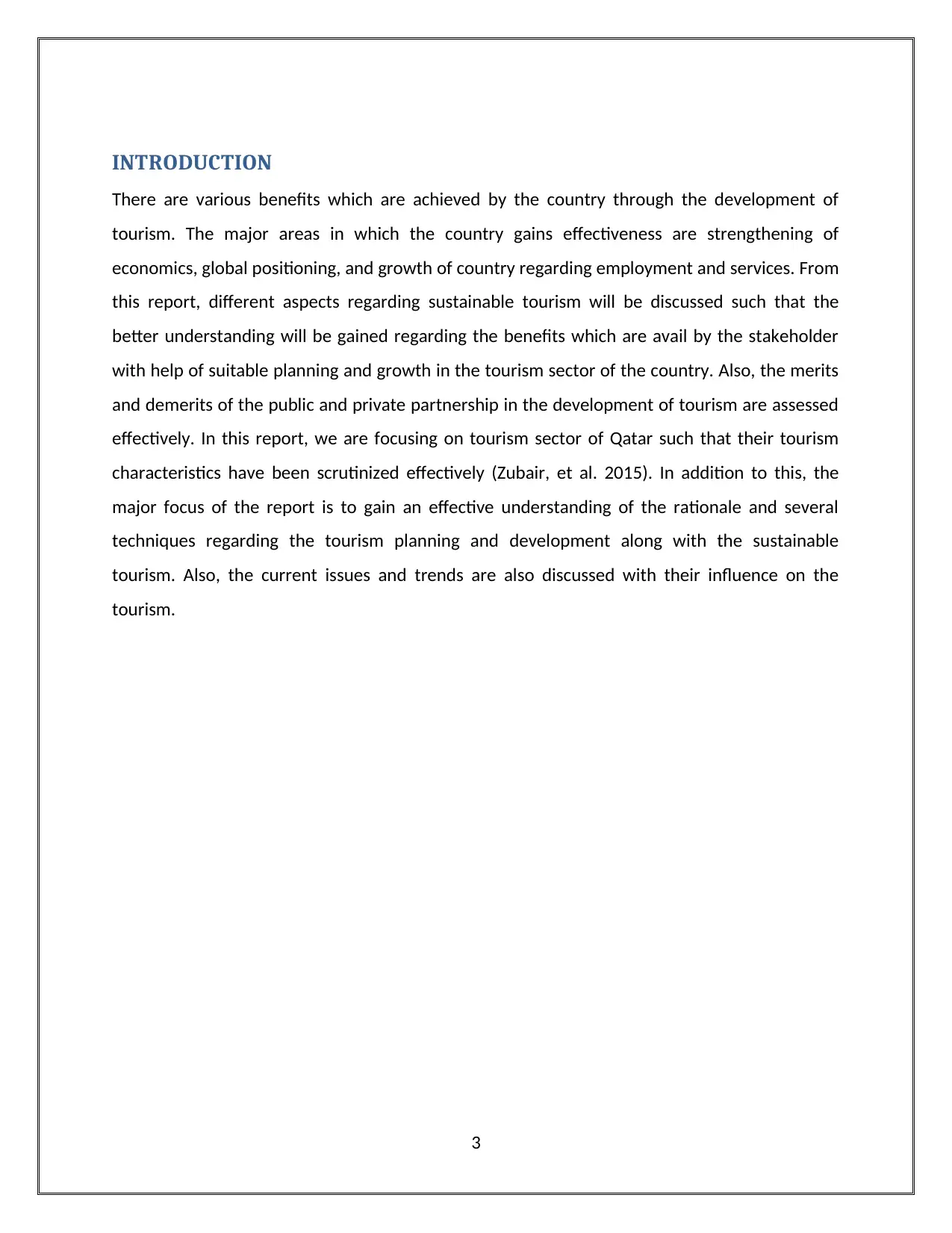
INTRODUCTION
There are various benefits which are achieved by the country through the development of
tourism. The major areas in which the country gains effectiveness are strengthening of
economics, global positioning, and growth of country regarding employment and services. From
this report, different aspects regarding sustainable tourism will be discussed such that the
better understanding will be gained regarding the benefits which are avail by the stakeholder
with help of suitable planning and growth in the tourism sector of the country. Also, the merits
and demerits of the public and private partnership in the development of tourism are assessed
effectively. In this report, we are focusing on tourism sector of Qatar such that their tourism
characteristics have been scrutinized effectively (Zubair, et al. 2015). In addition to this, the
major focus of the report is to gain an effective understanding of the rationale and several
techniques regarding the tourism planning and development along with the sustainable
tourism. Also, the current issues and trends are also discussed with their influence on the
tourism.
3
There are various benefits which are achieved by the country through the development of
tourism. The major areas in which the country gains effectiveness are strengthening of
economics, global positioning, and growth of country regarding employment and services. From
this report, different aspects regarding sustainable tourism will be discussed such that the
better understanding will be gained regarding the benefits which are avail by the stakeholder
with help of suitable planning and growth in the tourism sector of the country. Also, the merits
and demerits of the public and private partnership in the development of tourism are assessed
effectively. In this report, we are focusing on tourism sector of Qatar such that their tourism
characteristics have been scrutinized effectively (Zubair, et al. 2015). In addition to this, the
major focus of the report is to gain an effective understanding of the rationale and several
techniques regarding the tourism planning and development along with the sustainable
tourism. Also, the current issues and trends are also discussed with their influence on the
tourism.
3
Paraphrase This Document
Need a fresh take? Get an instant paraphrase of this document with our AI Paraphraser
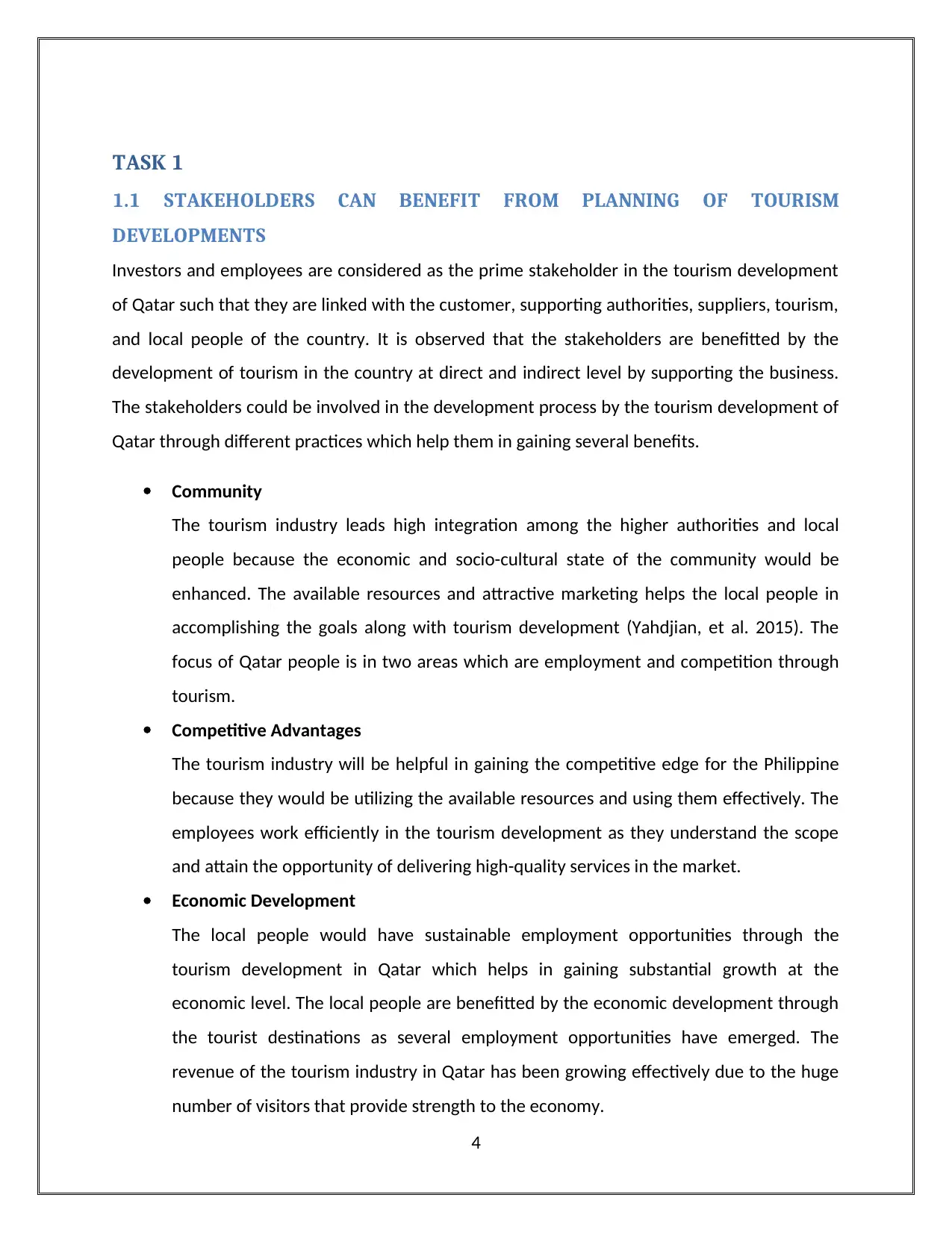
TASK 1
1.1 STAKEHOLDERS CAN BENEFIT FROM PLANNING OF TOURISM
DEVELOPMENTS
Investors and employees are considered as the prime stakeholder in the tourism development
of Qatar such that they are linked with the customer, supporting authorities, suppliers, tourism,
and local people of the country. It is observed that the stakeholders are benefitted by the
development of tourism in the country at direct and indirect level by supporting the business.
The stakeholders could be involved in the development process by the tourism development of
Qatar through different practices which help them in gaining several benefits.
Community
The tourism industry leads high integration among the higher authorities and local
people because the economic and socio-cultural state of the community would be
enhanced. The available resources and attractive marketing helps the local people in
accomplishing the goals along with tourism development (Yahdjian, et al. 2015). The
focus of Qatar people is in two areas which are employment and competition through
tourism.
Competitive Advantages
The tourism industry will be helpful in gaining the competitive edge for the Philippine
because they would be utilizing the available resources and using them effectively. The
employees work efficiently in the tourism development as they understand the scope
and attain the opportunity of delivering high-quality services in the market.
Economic Development
The local people would have sustainable employment opportunities through the
tourism development in Qatar which helps in gaining substantial growth at the
economic level. The local people are benefitted by the economic development through
the tourist destinations as several employment opportunities have emerged. The
revenue of the tourism industry in Qatar has been growing effectively due to the huge
number of visitors that provide strength to the economy.
4
1.1 STAKEHOLDERS CAN BENEFIT FROM PLANNING OF TOURISM
DEVELOPMENTS
Investors and employees are considered as the prime stakeholder in the tourism development
of Qatar such that they are linked with the customer, supporting authorities, suppliers, tourism,
and local people of the country. It is observed that the stakeholders are benefitted by the
development of tourism in the country at direct and indirect level by supporting the business.
The stakeholders could be involved in the development process by the tourism development of
Qatar through different practices which help them in gaining several benefits.
Community
The tourism industry leads high integration among the higher authorities and local
people because the economic and socio-cultural state of the community would be
enhanced. The available resources and attractive marketing helps the local people in
accomplishing the goals along with tourism development (Yahdjian, et al. 2015). The
focus of Qatar people is in two areas which are employment and competition through
tourism.
Competitive Advantages
The tourism industry will be helpful in gaining the competitive edge for the Philippine
because they would be utilizing the available resources and using them effectively. The
employees work efficiently in the tourism development as they understand the scope
and attain the opportunity of delivering high-quality services in the market.
Economic Development
The local people would have sustainable employment opportunities through the
tourism development in Qatar which helps in gaining substantial growth at the
economic level. The local people are benefitted by the economic development through
the tourist destinations as several employment opportunities have emerged. The
revenue of the tourism industry in Qatar has been growing effectively due to the huge
number of visitors that provide strength to the economy.
4
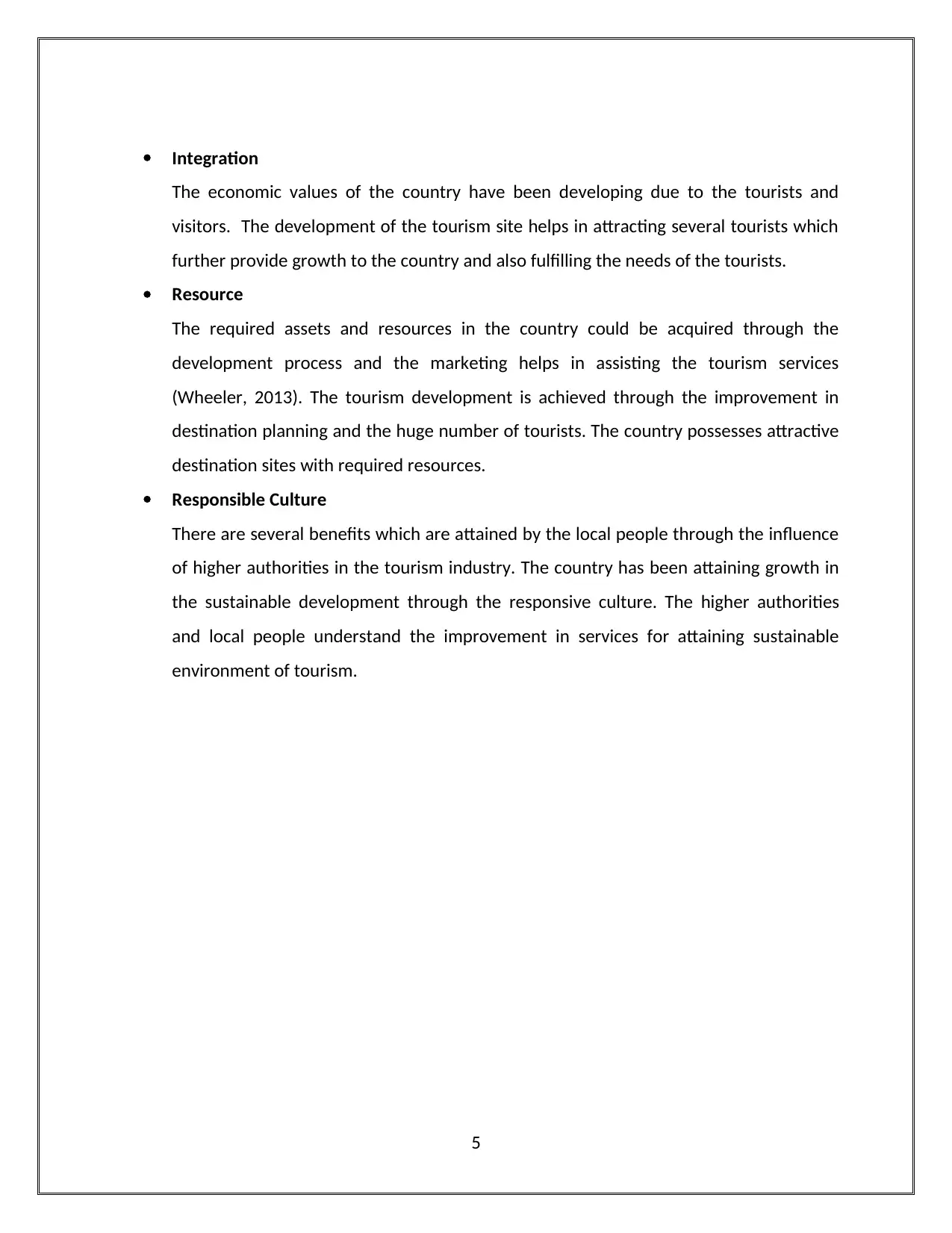
Integration
The economic values of the country have been developing due to the tourists and
visitors. The development of the tourism site helps in attracting several tourists which
further provide growth to the country and also fulfilling the needs of the tourists.
Resource
The required assets and resources in the country could be acquired through the
development process and the marketing helps in assisting the tourism services
(Wheeler, 2013). The tourism development is achieved through the improvement in
destination planning and the huge number of tourists. The country possesses attractive
destination sites with required resources.
Responsible Culture
There are several benefits which are attained by the local people through the influence
of higher authorities in the tourism industry. The country has been attaining growth in
the sustainable development through the responsive culture. The higher authorities
and local people understand the improvement in services for attaining sustainable
environment of tourism.
5
The economic values of the country have been developing due to the tourists and
visitors. The development of the tourism site helps in attracting several tourists which
further provide growth to the country and also fulfilling the needs of the tourists.
Resource
The required assets and resources in the country could be acquired through the
development process and the marketing helps in assisting the tourism services
(Wheeler, 2013). The tourism development is achieved through the improvement in
destination planning and the huge number of tourists. The country possesses attractive
destination sites with required resources.
Responsible Culture
There are several benefits which are attained by the local people through the influence
of higher authorities in the tourism industry. The country has been attaining growth in
the sustainable development through the responsive culture. The higher authorities
and local people understand the improvement in services for attaining sustainable
environment of tourism.
5
⊘ This is a preview!⊘
Do you want full access?
Subscribe today to unlock all pages.

Trusted by 1+ million students worldwide
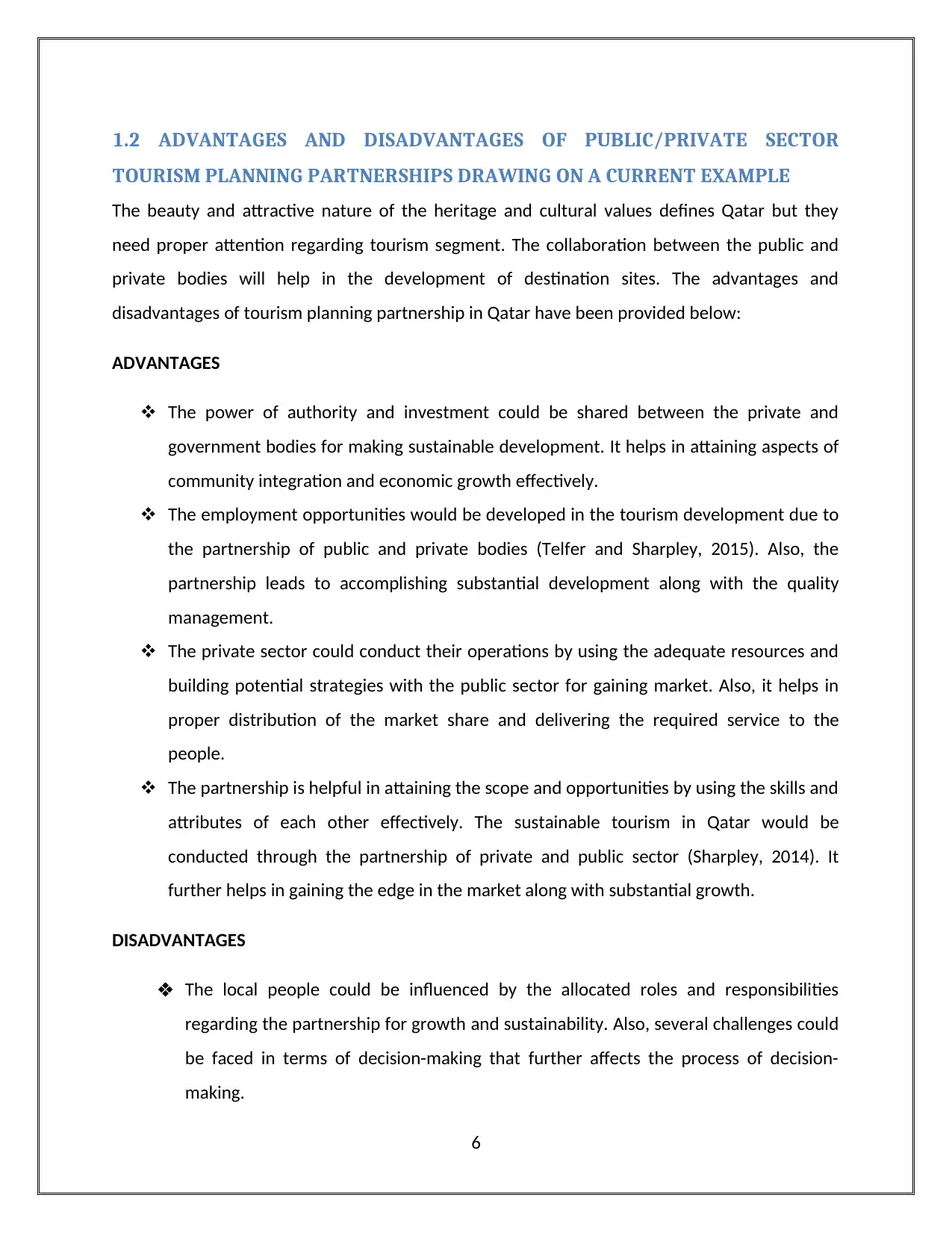
1.2 ADVANTAGES AND DISADVANTAGES OF PUBLIC/PRIVATE SECTOR
TOURISM PLANNING PARTNERSHIPS DRAWING ON A CURRENT EXAMPLE
The beauty and attractive nature of the heritage and cultural values defines Qatar but they
need proper attention regarding tourism segment. The collaboration between the public and
private bodies will help in the development of destination sites. The advantages and
disadvantages of tourism planning partnership in Qatar have been provided below:
ADVANTAGES
The power of authority and investment could be shared between the private and
government bodies for making sustainable development. It helps in attaining aspects of
community integration and economic growth effectively.
The employment opportunities would be developed in the tourism development due to
the partnership of public and private bodies (Telfer and Sharpley, 2015). Also, the
partnership leads to accomplishing substantial development along with the quality
management.
The private sector could conduct their operations by using the adequate resources and
building potential strategies with the public sector for gaining market. Also, it helps in
proper distribution of the market share and delivering the required service to the
people.
The partnership is helpful in attaining the scope and opportunities by using the skills and
attributes of each other effectively. The sustainable tourism in Qatar would be
conducted through the partnership of private and public sector (Sharpley, 2014). It
further helps in gaining the edge in the market along with substantial growth.
DISADVANTAGES
The local people could be influenced by the allocated roles and responsibilities
regarding the partnership for growth and sustainability. Also, several challenges could
be faced in terms of decision-making that further affects the process of decision-
making.
6
TOURISM PLANNING PARTNERSHIPS DRAWING ON A CURRENT EXAMPLE
The beauty and attractive nature of the heritage and cultural values defines Qatar but they
need proper attention regarding tourism segment. The collaboration between the public and
private bodies will help in the development of destination sites. The advantages and
disadvantages of tourism planning partnership in Qatar have been provided below:
ADVANTAGES
The power of authority and investment could be shared between the private and
government bodies for making sustainable development. It helps in attaining aspects of
community integration and economic growth effectively.
The employment opportunities would be developed in the tourism development due to
the partnership of public and private bodies (Telfer and Sharpley, 2015). Also, the
partnership leads to accomplishing substantial development along with the quality
management.
The private sector could conduct their operations by using the adequate resources and
building potential strategies with the public sector for gaining market. Also, it helps in
proper distribution of the market share and delivering the required service to the
people.
The partnership is helpful in attaining the scope and opportunities by using the skills and
attributes of each other effectively. The sustainable tourism in Qatar would be
conducted through the partnership of private and public sector (Sharpley, 2014). It
further helps in gaining the edge in the market along with substantial growth.
DISADVANTAGES
The local people could be influenced by the allocated roles and responsibilities
regarding the partnership for growth and sustainability. Also, several challenges could
be faced in terms of decision-making that further affects the process of decision-
making.
6
Paraphrase This Document
Need a fresh take? Get an instant paraphrase of this document with our AI Paraphraser
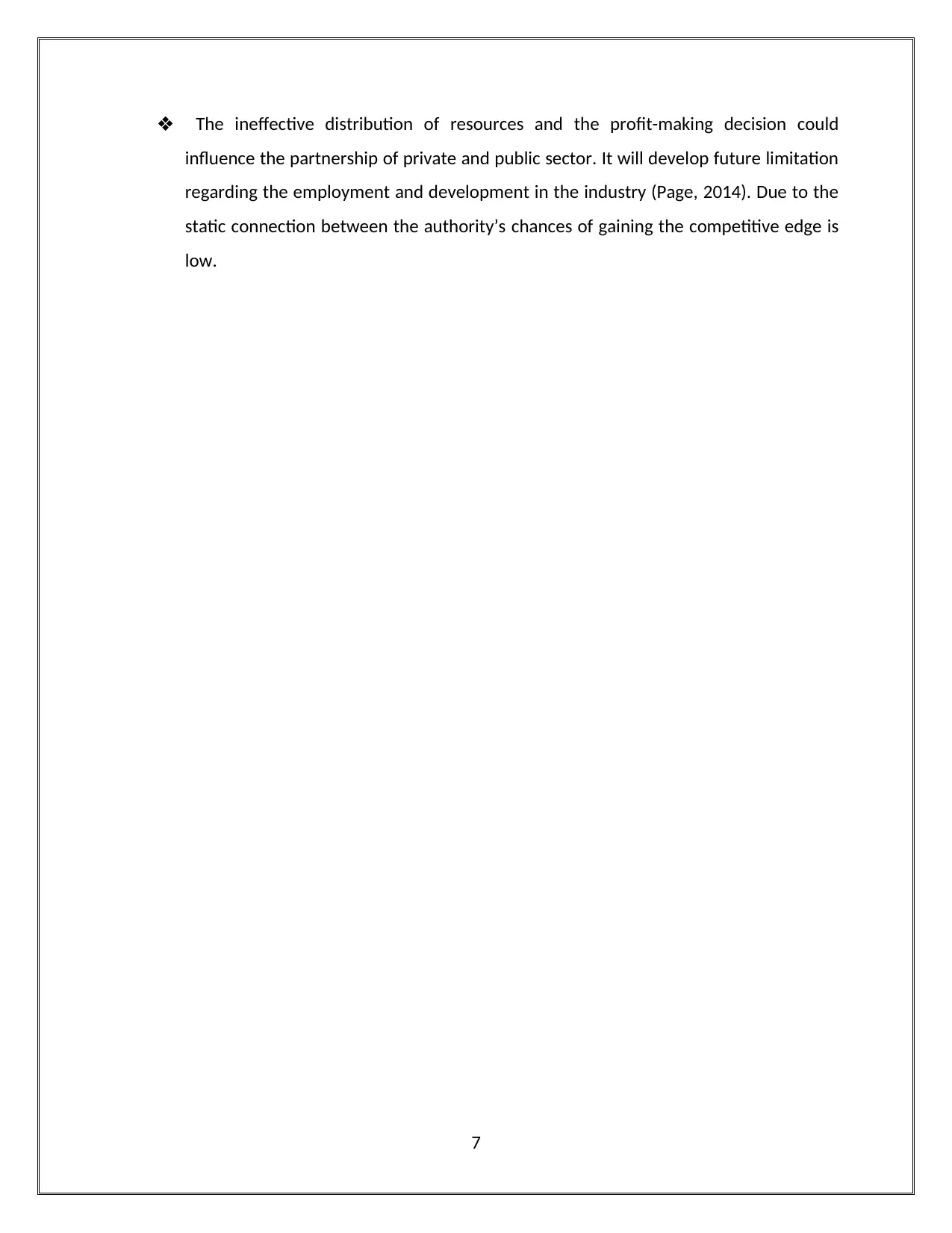
The ineffective distribution of resources and the profit-making decision could
influence the partnership of private and public sector. It will develop future limitation
regarding the employment and development in the industry (Page, 2014). Due to the
static connection between the authority’s chances of gaining the competitive edge is
low.
7
influence the partnership of private and public sector. It will develop future limitation
regarding the employment and development in the industry (Page, 2014). Due to the
static connection between the authority’s chances of gaining the competitive edge is
low.
7
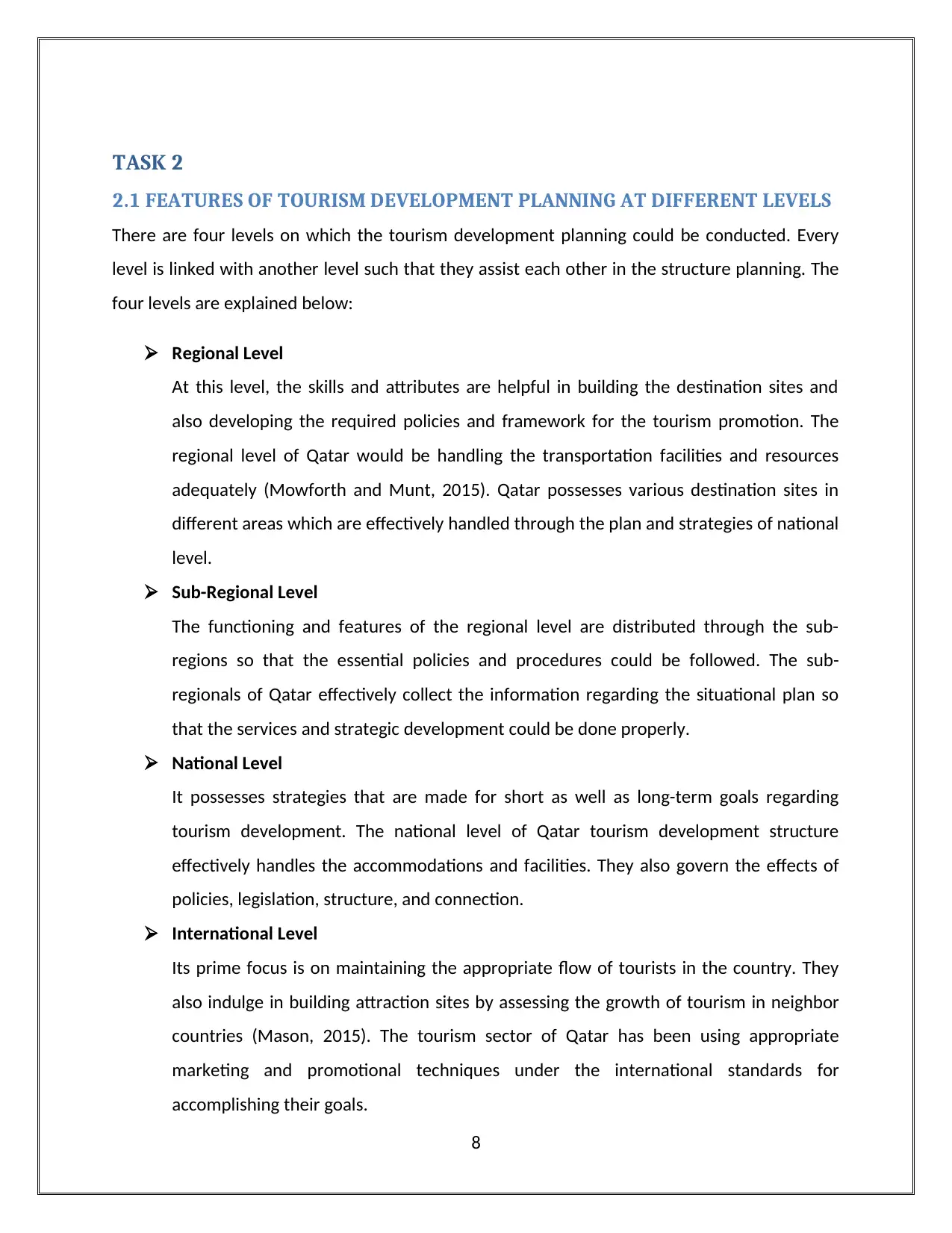
TASK 2
2.1 FEATURES OF TOURISM DEVELOPMENT PLANNING AT DIFFERENT LEVELS
There are four levels on which the tourism development planning could be conducted. Every
level is linked with another level such that they assist each other in the structure planning. The
four levels are explained below:
Regional Level
At this level, the skills and attributes are helpful in building the destination sites and
also developing the required policies and framework for the tourism promotion. The
regional level of Qatar would be handling the transportation facilities and resources
adequately (Mowforth and Munt, 2015). Qatar possesses various destination sites in
different areas which are effectively handled through the plan and strategies of national
level.
Sub-Regional Level
The functioning and features of the regional level are distributed through the sub-
regions so that the essential policies and procedures could be followed. The sub-
regionals of Qatar effectively collect the information regarding the situational plan so
that the services and strategic development could be done properly.
National Level
It possesses strategies that are made for short as well as long-term goals regarding
tourism development. The national level of Qatar tourism development structure
effectively handles the accommodations and facilities. They also govern the effects of
policies, legislation, structure, and connection.
International Level
Its prime focus is on maintaining the appropriate flow of tourists in the country. They
also indulge in building attraction sites by assessing the growth of tourism in neighbor
countries (Mason, 2015). The tourism sector of Qatar has been using appropriate
marketing and promotional techniques under the international standards for
accomplishing their goals.
8
2.1 FEATURES OF TOURISM DEVELOPMENT PLANNING AT DIFFERENT LEVELS
There are four levels on which the tourism development planning could be conducted. Every
level is linked with another level such that they assist each other in the structure planning. The
four levels are explained below:
Regional Level
At this level, the skills and attributes are helpful in building the destination sites and
also developing the required policies and framework for the tourism promotion. The
regional level of Qatar would be handling the transportation facilities and resources
adequately (Mowforth and Munt, 2015). Qatar possesses various destination sites in
different areas which are effectively handled through the plan and strategies of national
level.
Sub-Regional Level
The functioning and features of the regional level are distributed through the sub-
regions so that the essential policies and procedures could be followed. The sub-
regionals of Qatar effectively collect the information regarding the situational plan so
that the services and strategic development could be done properly.
National Level
It possesses strategies that are made for short as well as long-term goals regarding
tourism development. The national level of Qatar tourism development structure
effectively handles the accommodations and facilities. They also govern the effects of
policies, legislation, structure, and connection.
International Level
Its prime focus is on maintaining the appropriate flow of tourists in the country. They
also indulge in building attraction sites by assessing the growth of tourism in neighbor
countries (Mason, 2015). The tourism sector of Qatar has been using appropriate
marketing and promotional techniques under the international standards for
accomplishing their goals.
8
⊘ This is a preview!⊘
Do you want full access?
Subscribe today to unlock all pages.

Trusted by 1+ million students worldwide
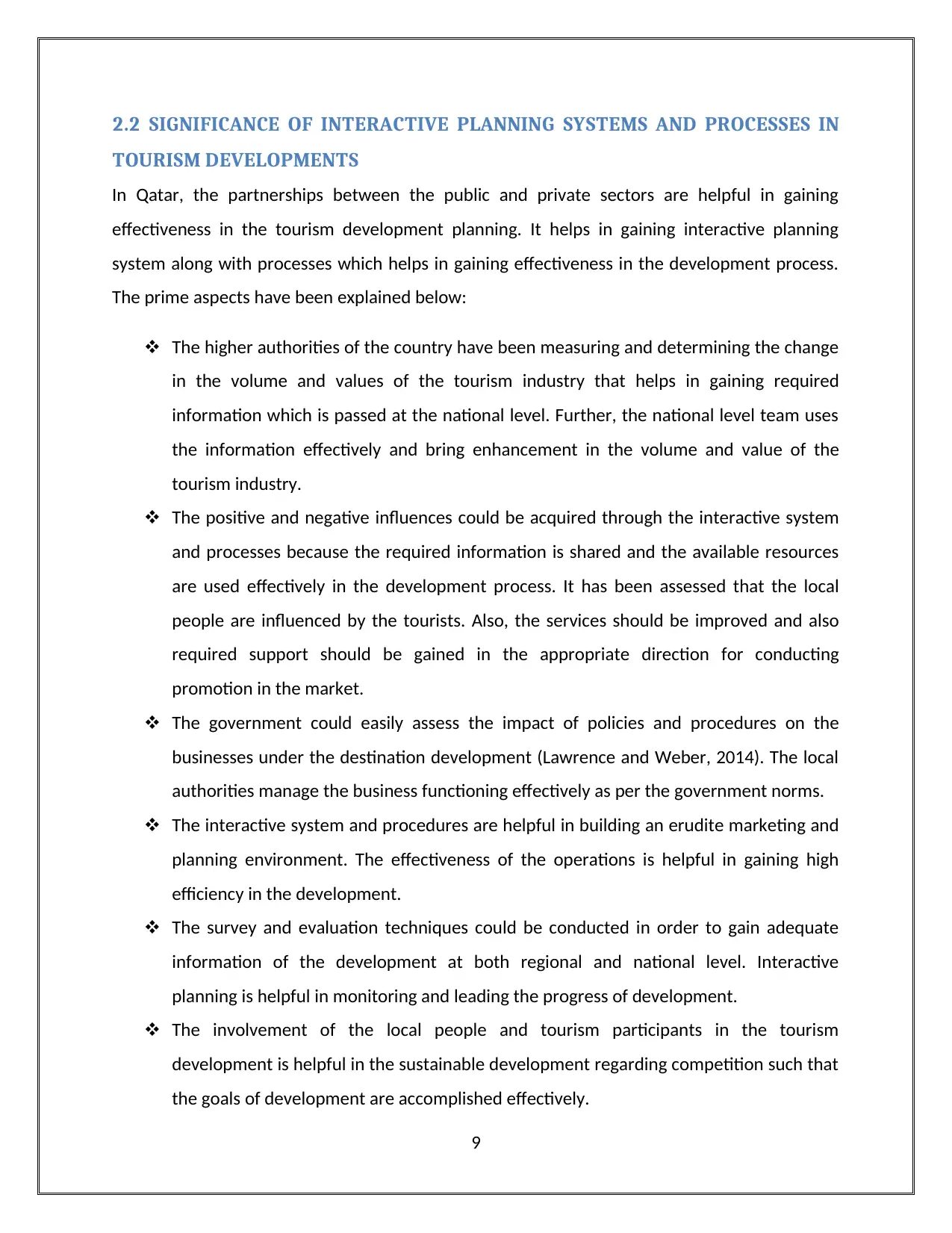
2.2 SIGNIFICANCE OF INTERACTIVE PLANNING SYSTEMS AND PROCESSES IN
TOURISM DEVELOPMENTS
In Qatar, the partnerships between the public and private sectors are helpful in gaining
effectiveness in the tourism development planning. It helps in gaining interactive planning
system along with processes which helps in gaining effectiveness in the development process.
The prime aspects have been explained below:
The higher authorities of the country have been measuring and determining the change
in the volume and values of the tourism industry that helps in gaining required
information which is passed at the national level. Further, the national level team uses
the information effectively and bring enhancement in the volume and value of the
tourism industry.
The positive and negative influences could be acquired through the interactive system
and processes because the required information is shared and the available resources
are used effectively in the development process. It has been assessed that the local
people are influenced by the tourists. Also, the services should be improved and also
required support should be gained in the appropriate direction for conducting
promotion in the market.
The government could easily assess the impact of policies and procedures on the
businesses under the destination development (Lawrence and Weber, 2014). The local
authorities manage the business functioning effectively as per the government norms.
The interactive system and procedures are helpful in building an erudite marketing and
planning environment. The effectiveness of the operations is helpful in gaining high
efficiency in the development.
The survey and evaluation techniques could be conducted in order to gain adequate
information of the development at both regional and national level. Interactive
planning is helpful in monitoring and leading the progress of development.
The involvement of the local people and tourism participants in the tourism
development is helpful in the sustainable development regarding competition such that
the goals of development are accomplished effectively.
9
TOURISM DEVELOPMENTS
In Qatar, the partnerships between the public and private sectors are helpful in gaining
effectiveness in the tourism development planning. It helps in gaining interactive planning
system along with processes which helps in gaining effectiveness in the development process.
The prime aspects have been explained below:
The higher authorities of the country have been measuring and determining the change
in the volume and values of the tourism industry that helps in gaining required
information which is passed at the national level. Further, the national level team uses
the information effectively and bring enhancement in the volume and value of the
tourism industry.
The positive and negative influences could be acquired through the interactive system
and processes because the required information is shared and the available resources
are used effectively in the development process. It has been assessed that the local
people are influenced by the tourists. Also, the services should be improved and also
required support should be gained in the appropriate direction for conducting
promotion in the market.
The government could easily assess the impact of policies and procedures on the
businesses under the destination development (Lawrence and Weber, 2014). The local
authorities manage the business functioning effectively as per the government norms.
The interactive system and procedures are helpful in building an erudite marketing and
planning environment. The effectiveness of the operations is helpful in gaining high
efficiency in the development.
The survey and evaluation techniques could be conducted in order to gain adequate
information of the development at both regional and national level. Interactive
planning is helpful in monitoring and leading the progress of development.
The involvement of the local people and tourism participants in the tourism
development is helpful in the sustainable development regarding competition such that
the goals of development are accomplished effectively.
9
Paraphrase This Document
Need a fresh take? Get an instant paraphrase of this document with our AI Paraphraser
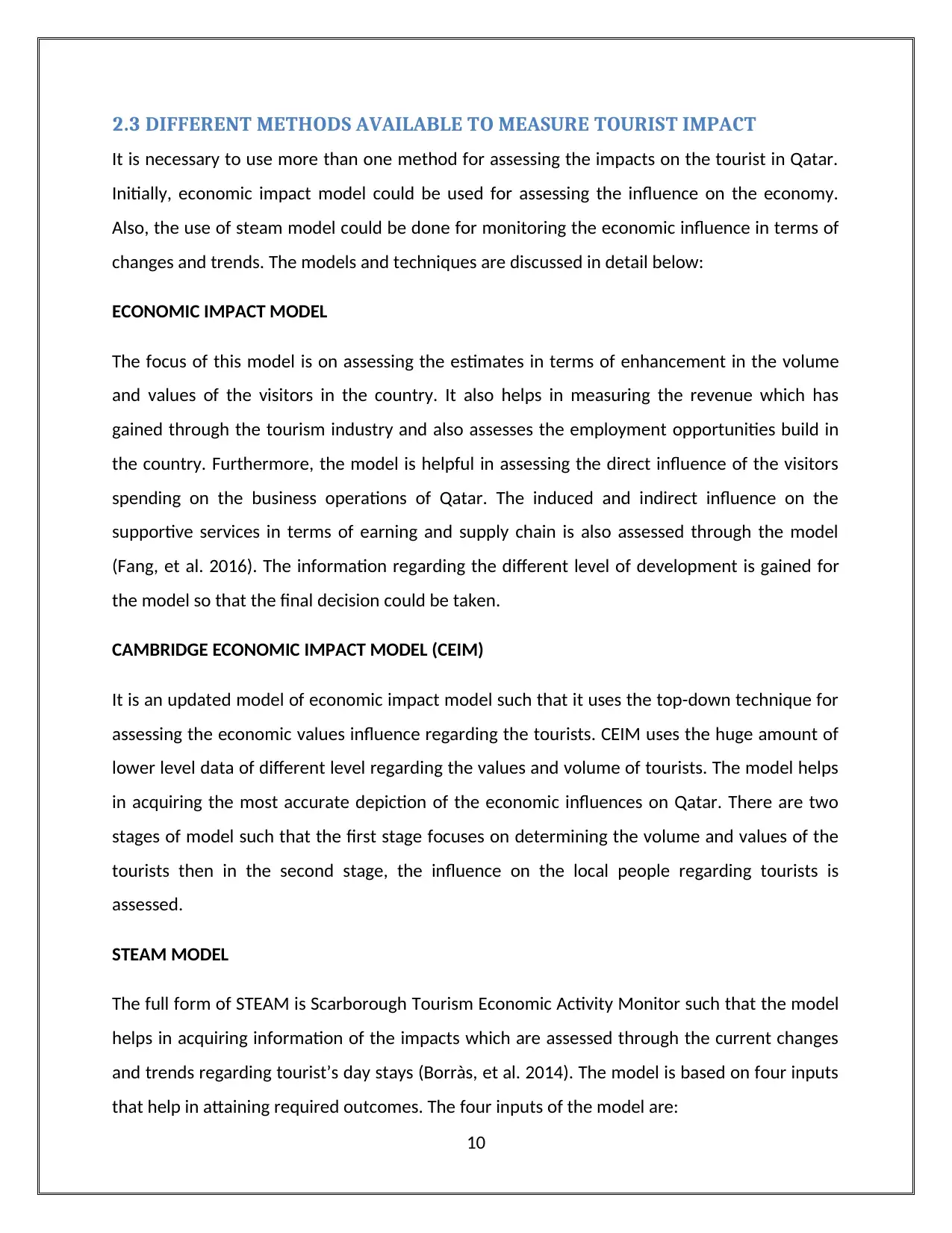
2.3 DIFFERENT METHODS AVAILABLE TO MEASURE TOURIST IMPACT
It is necessary to use more than one method for assessing the impacts on the tourist in Qatar.
Initially, economic impact model could be used for assessing the influence on the economy.
Also, the use of steam model could be done for monitoring the economic influence in terms of
changes and trends. The models and techniques are discussed in detail below:
ECONOMIC IMPACT MODEL
The focus of this model is on assessing the estimates in terms of enhancement in the volume
and values of the visitors in the country. It also helps in measuring the revenue which has
gained through the tourism industry and also assesses the employment opportunities build in
the country. Furthermore, the model is helpful in assessing the direct influence of the visitors
spending on the business operations of Qatar. The induced and indirect influence on the
supportive services in terms of earning and supply chain is also assessed through the model
(Fang, et al. 2016). The information regarding the different level of development is gained for
the model so that the final decision could be taken.
CAMBRIDGE ECONOMIC IMPACT MODEL (CEIM)
It is an updated model of economic impact model such that it uses the top-down technique for
assessing the economic values influence regarding the tourists. CEIM uses the huge amount of
lower level data of different level regarding the values and volume of tourists. The model helps
in acquiring the most accurate depiction of the economic influences on Qatar. There are two
stages of model such that the first stage focuses on determining the volume and values of the
tourists then in the second stage, the influence on the local people regarding tourists is
assessed.
STEAM MODEL
The full form of STEAM is Scarborough Tourism Economic Activity Monitor such that the model
helps in acquiring information of the impacts which are assessed through the current changes
and trends regarding tourist’s day stays (Borràs, et al. 2014). The model is based on four inputs
that help in attaining required outcomes. The four inputs of the model are:
10
It is necessary to use more than one method for assessing the impacts on the tourist in Qatar.
Initially, economic impact model could be used for assessing the influence on the economy.
Also, the use of steam model could be done for monitoring the economic influence in terms of
changes and trends. The models and techniques are discussed in detail below:
ECONOMIC IMPACT MODEL
The focus of this model is on assessing the estimates in terms of enhancement in the volume
and values of the visitors in the country. It also helps in measuring the revenue which has
gained through the tourism industry and also assesses the employment opportunities build in
the country. Furthermore, the model is helpful in assessing the direct influence of the visitors
spending on the business operations of Qatar. The induced and indirect influence on the
supportive services in terms of earning and supply chain is also assessed through the model
(Fang, et al. 2016). The information regarding the different level of development is gained for
the model so that the final decision could be taken.
CAMBRIDGE ECONOMIC IMPACT MODEL (CEIM)
It is an updated model of economic impact model such that it uses the top-down technique for
assessing the economic values influence regarding the tourists. CEIM uses the huge amount of
lower level data of different level regarding the values and volume of tourists. The model helps
in acquiring the most accurate depiction of the economic influences on Qatar. There are two
stages of model such that the first stage focuses on determining the volume and values of the
tourists then in the second stage, the influence on the local people regarding tourists is
assessed.
STEAM MODEL
The full form of STEAM is Scarborough Tourism Economic Activity Monitor such that the model
helps in acquiring information of the impacts which are assessed through the current changes
and trends regarding tourist’s day stays (Borràs, et al. 2014). The model is based on four inputs
that help in attaining required outcomes. The four inputs of the model are:
10
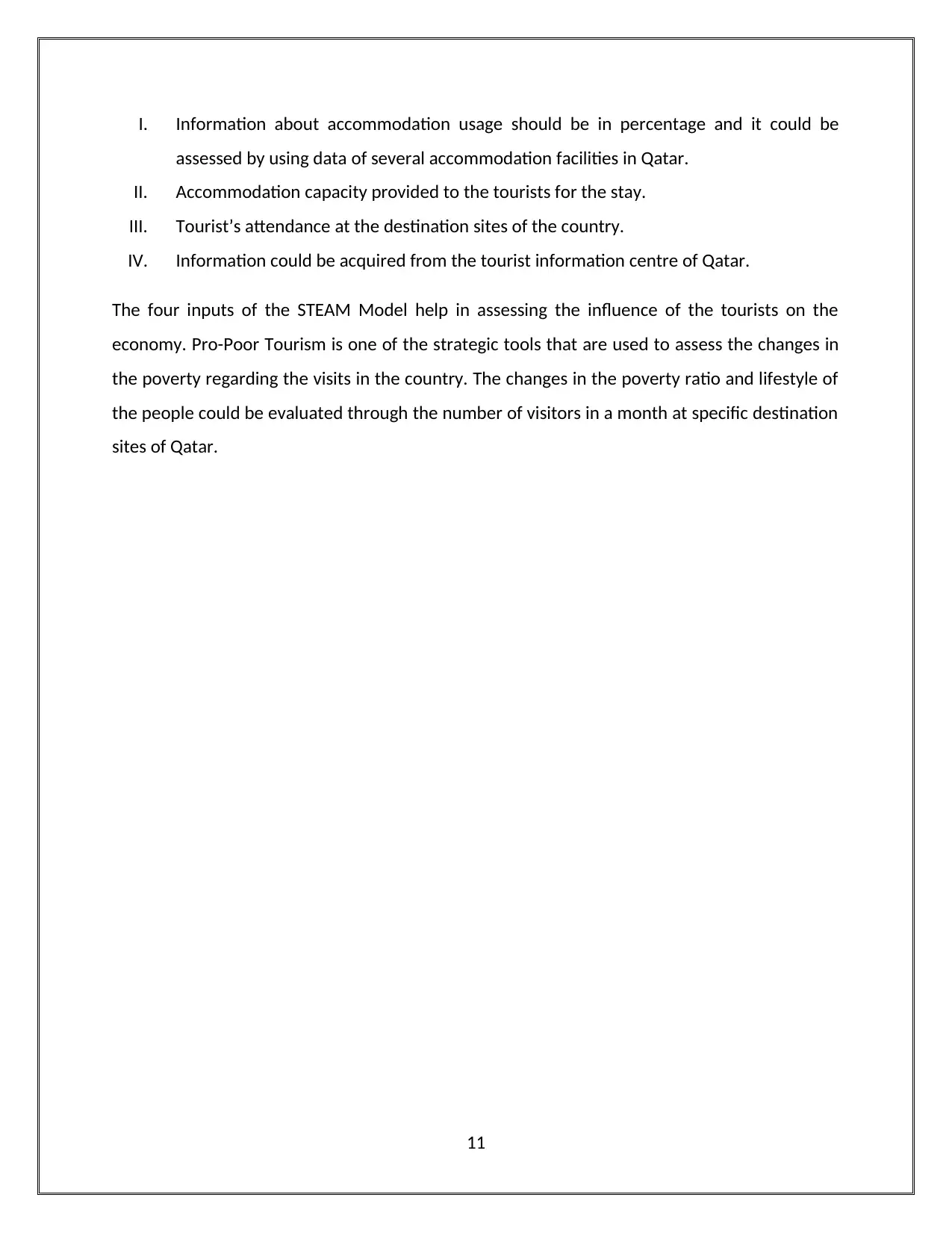
I. Information about accommodation usage should be in percentage and it could be
assessed by using data of several accommodation facilities in Qatar.
II. Accommodation capacity provided to the tourists for the stay.
III. Tourist’s attendance at the destination sites of the country.
IV. Information could be acquired from the tourist information centre of Qatar.
The four inputs of the STEAM Model help in assessing the influence of the tourists on the
economy. Pro-Poor Tourism is one of the strategic tools that are used to assess the changes in
the poverty regarding the visits in the country. The changes in the poverty ratio and lifestyle of
the people could be evaluated through the number of visitors in a month at specific destination
sites of Qatar.
11
assessed by using data of several accommodation facilities in Qatar.
II. Accommodation capacity provided to the tourists for the stay.
III. Tourist’s attendance at the destination sites of the country.
IV. Information could be acquired from the tourist information centre of Qatar.
The four inputs of the STEAM Model help in assessing the influence of the tourists on the
economy. Pro-Poor Tourism is one of the strategic tools that are used to assess the changes in
the poverty regarding the visits in the country. The changes in the poverty ratio and lifestyle of
the people could be evaluated through the number of visitors in a month at specific destination
sites of Qatar.
11
⊘ This is a preview!⊘
Do you want full access?
Subscribe today to unlock all pages.

Trusted by 1+ million students worldwide
1 out of 28
Related Documents
Your All-in-One AI-Powered Toolkit for Academic Success.
+13062052269
info@desklib.com
Available 24*7 on WhatsApp / Email
![[object Object]](/_next/static/media/star-bottom.7253800d.svg)
Unlock your academic potential
Copyright © 2020–2026 A2Z Services. All Rights Reserved. Developed and managed by ZUCOL.


